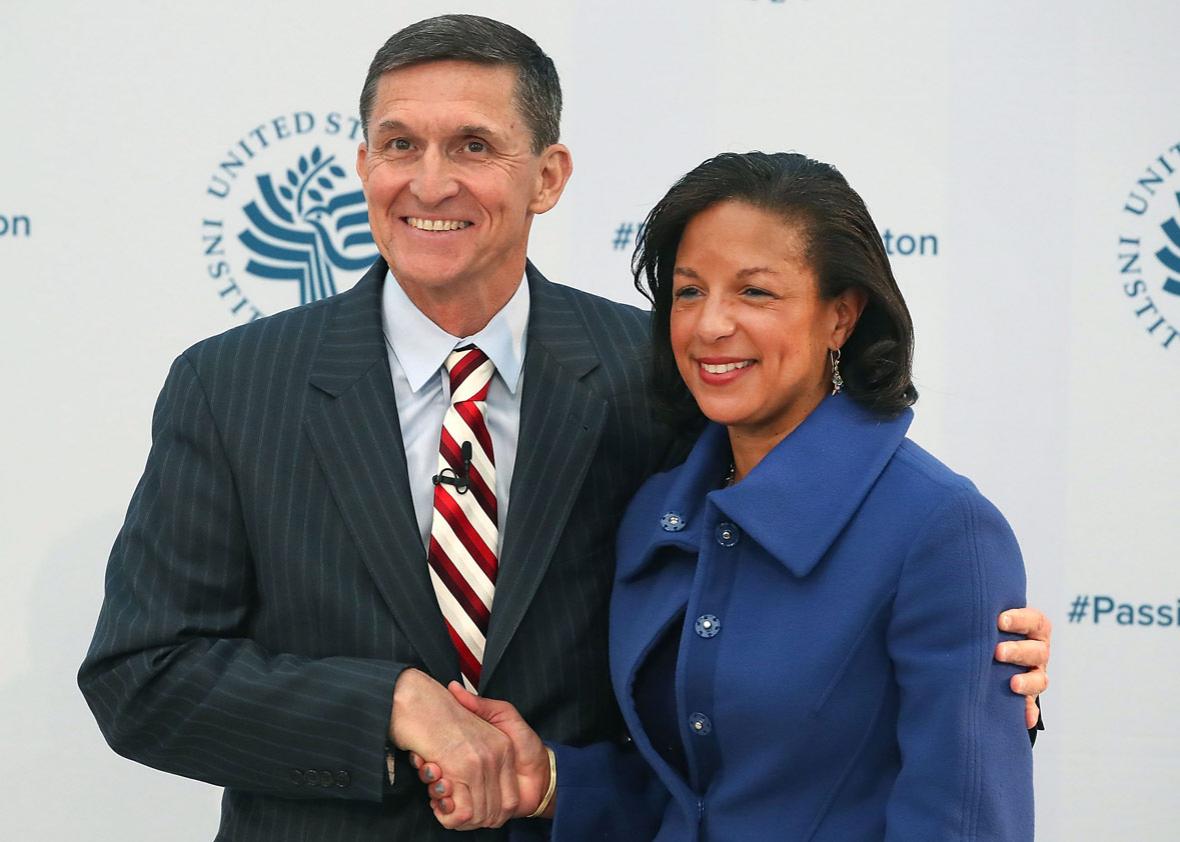The right-wing media is really excited about the new scoop from Eli Lake, national security columnist for Bloomberg View. As connoisseurs of President Trump’s Twitter feed know, in the alternative reality inhabited by the president and his admirers, the central scandal rocking Washington is not about Trump’s possible connections to Russia and what it means for its meddling in our election. Rather, it’s about the potential “unmasking” of Trump campaign figures that may have been caught up in incidental surveillance of foreign targets. “Such amazing reporting on unmasking and the crooked scheme against us by @foxandfriends,” Trump tweeted on Monday morning. “ ‘Spied on before nomination.’ The real story.” Thus it was a big deal when Lake reported that Susan Rice, President Obama’s former national security adviser, had sought to identify Trump associates inadvertently recorded in American surveillance operations. Suddenly, Trump’s “real story” had a villainess. Soon #SusanRice was trending on Twitter.
“White House lawyers last month learned that the former national security adviser Susan Rice requested the identities of U.S. persons in raw intelligence reports on dozens of occasions that connect to the Donald Trump transition and campaign, according to U.S. officials familiar with the matter,” Lake’s piece begins. Sounds scandalous! At least, it does unless you read down to the ninth paragraph, which says, “The standard for senior officials to learn the names of U.S. persons incidentally collected is that it must have some foreign intelligence value, a standard that can apply to almost anything. This suggests Rice’s unmasking requests were likely within the law.”
That means that even if Lake’s reporting, which relies on two anonymous sources, is completely correct, Rice did nothing wrong. There is no “unmasking” scandal. The whole thing is bullshit, a reality TV storyline jointly spun by Republicans and the right-wing media. It’s a clever bit of misdirection and mystification meant to do two things. First, it’s supposed to validate the president’s March 4 tweet claiming that Obama put a “tapp” on his phone during the presidential campaign, though it does no such thing. Second, the “unmasking” drama is meant to make it seem as if the real scandal lies in the investigation into the Trump team’s foreign contacts—which Trump would have us believe was politically motivated—and not the contacts themselves.
In fact, it would have been a dereliction of duty for the Obama administration, which was still in charge of the country’s national security, to ignore suspicious contacts by members of the Trump transition team. After all, at the time, the FBI investigation into ties between the Trump campaign and Russian attempts to subvert the election had already begun. We also now know that Michael Flynn, who would soon assume Rice’s job, was a paid foreign agent of Turkey. According to ex-CIA Director James Woolsey, Flynn met with representatives of the Turkish government to discuss kidnapping Fethullah Gülen, a government critic who lives in Pennsylvania, and sending him back to Turkey outside of normal extradition channels. (Flynn denies that this happened.) Trump himself has alleged financial ties with Russian mobsters. At the time of the alleged unmasking, all these men were still private citizens. If they were talking to targets of American surveillance, the people in charge of our national security had an obligation to understand why.
Obviously, when American citizens get caught up in incidental surveillance, it raises civil liberties concerns. If Trump and his apologists wanted to argue that this incident shows the need for greater privacy protections for all Americans, they might have a point. Instead, they’re trying to pretend that the fact that they were monitored on perfectly legal surveillance is evidence of a sinister plot again them.
Perhaps some credit is due to Trump here. The uproar over unmasking is a reminder that however incompetent he is at governing, he has an undeniable talent for propaganda and manipulation. The central fact of this episode—that members of Trump’s transition were talking to people that the U.S. was spying on—doesn’t, on its surface, look great for the president, given the multiple investigations into his Russia ties. That one of these figures was caught lying about those ties and lost his job because of it—and is now trying to request immunity in exchange for his testimony—looks worse. Yet through an act of narrative jujitsu, Trump and his allies have turned evidence that our intelligence agencies noticed their questionable contacts into vindication of their wild conspiracy theories.
As we know from Whitewater, Benghazi, and the never-ending probe into Hillary Clinton’s email server, Republicans are good at creating phantasmagorical pseudo-scandals that eat up lots of investigative energy and leave a vague impression of impropriety without proving much. We’ll probably be hearing about “unmasking” for as long as Trump remains in office. The real scandal, however, almost certainly lies in how he got there.
